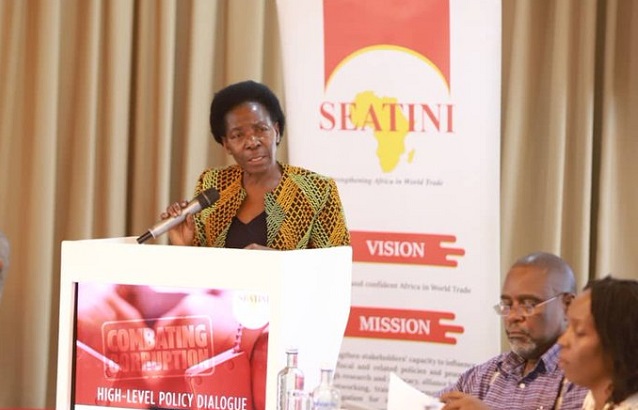
Kampala, Uganda | THE INDEPENDENT | As Africa marked the anti-corruption fight day, Uganda was urged to reconsider her own way of dealing with the vice, if a headway is to be made, since the institutions are in place.
This is because, despite the several efforts the country has put in place, especially in terms of institutional frameworks, corruption has persisted unabated, with reports putting the annual loss of government revenues at between nine and 10 trillion shillings.
On July 11, 2023, the African Union Convention on Preventing and Combating Corruption (AUCPCC) was adopted and the AU commemorates this day annually, and this year’s theme is: Promoting Human Dignity in the Fight Against Corruption.
It is aimed at contributing to a collective commitment on rooting out corruption and enhancing good governance in Africa.
Speaking at a policy dialogue on combating corruption under the theme “Promoting Debt and Fiscal Justice for dignified lives,” good governance campaigner and former member of parliament, Stephen Birahwa Mukitale, said corruption levels in Uganda would be greatly reduced if the procurement system was reformed.
The dialogue was organised by SEATINI Uganda under the Tax Justice Africa Uganda chapter.It is said that at least 60 percent of corruption in Uganda is procurement based.
Mukitale, also an Executive Board Member of the National Planning Authority, said he has for long proposed that public procurement, especially for high value assets and contracts, be recentralised at least to tackle corruption that is based at Local Government and Government Agency levels.
It is also said that the value lost to corruption in Uganda is equivalent to what the government gets or needs in terms of foreign assistance annually, meaning that if the gaps were blocked, Uganda would have no need to borrow.
Unfortunately, he says, that there are individuals who gain from it when a country goes for the expensive loans.
Uganda’s official data shows that the national debt is projected at 116 Trillion Shillings (31.5 Billion Dollars) by the end of 2025/2026.
However, Mukitale says this does not show the real position of the country’s indebtedness since the compilations leave out other sources of credit like public private partnerships.
He gave the example of the oil and gas industry PPSs which, according to him, will soon be valued at more than 25 Billion Dollars, and Ugandan will be made to pay for the country’s part of the PPP.
The worse part, Mukitale adds, the oil and gas is hardly spending on local and important sectors like the tourism industry.
SEATINI Uganda Executive Director, Jane Nalunga, said both corruption and high debt levels, deny the country development opportunities by consuming resource that would otherwise go to provision of social services.
According to her, dignity does not mean wealth, but ensuring that people have adequate access to basic social services, stressing the need for every one to get involved in fighting corruption.
She urged the government to stop acquiring loans without properly planning for them as this ends up making Ugandan pay for idle debt, or misuse the resource generally.
Mukitale also supported this, giving the example of assets like the Kabalega International Airport in Hoima, whose loan is due for repayment yet the facility is not yet operational.
Joel Wanjala, the Under Secretary of the Directorate of Ethics and Integrity admitted that corruption was Uganda’s many enemy and a major obstacle to government programs and development goals.
He says the efforts that have been put in place including the institutions and automation of systems, cannot work unless those responsible due their duties with integrity and ethically.
“The lack of integrity among human resources including MPs, civil servants, and supervisors is the core driver of corruption, not the absence of resources,” said Wanjala, adding, “Technology alone cannot stop corruption because people without integrity can circumvent systems; so strong ethical values are essential”.
He called for continuous dialogue between different stakeholders like civil society, political leaders and government.In his response, Joseph Sewungu, MP for Kalungu County West, blamed the government for the weak institutions including the parliament.
“Oversight functions of Parliament are weakened deliberately, leading to unchecked classified expenditures and corruption, as the Auditor General avoids auditing powerful offices, leaving corruption within State House and other institutions unchallenged,” he said.
This, he say, is the same with the Public Finance Management Act, whose effectiveness is affected by corruption.
“The Public Finance Management Act is strong but rendered ineffective due to corrupt practices by the sitting regime and Parliament members, who override accountability measures and misuse appropriations,” he said, adding that loans are misused and become non-performing because Parliament approves loans that are not utilized properly, with funds hemorrhaged due to corruption within the system.
Speaking of the procurement system and processes as centres of corruption, Catherine Natukunda, a Procurement Senior Officer at the Public Procurement and Disposal of Public Assets Authority (PPDA), explained that various reasons give opportunity for corruption along the procurement value chain.
“Contract implementation stages are prone to corruption, including delayed payments, unjustified variations, and issues with right-of-way; PPDA is working to stop unjustified variations and requires all approvals before project implementation,” she said.
*****
URN
 The Independent Uganda: You get the Truth we Pay the Price
The Independent Uganda: You get the Truth we Pay the Price



